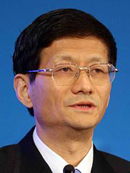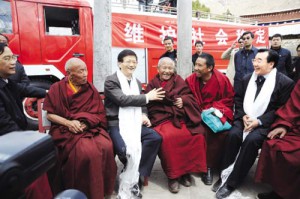Meng Jianzhu 孟建柱
Secretary, Politics & Law Commission
1947
A Deputy Chair of the Tibet Work Leading Group. In charge of Security.

Overview
Pronunciation: Mung Jeeyen-joo soundbite
Born: 1947, Jiangsu Province.
Education: MA in industrial systems engineering, Shanghai Mechanical Engineering Institute.
Career: Cheng Li describes Meng as part of Jiang Zemin’s “Shanghai Gang” (which has different philosophies from Hu/Wen).
Prospects: Meng joined the Politburo in 2012 but missed out on the Standing Committee, as the number of seats were reduced from 9 to 7.
Relevance to Tibet: A Deputy Chair of the Tibet Work Leading Group, Politburo Member, State Councilor. Succeeded to Zhou Yongkang’s Politics and Law Commission role.
Standing in the Party and Career Highlights:
Member of the 18th Politburo. Secretary, Politics and Law Commission. A former State Councilor.
Minister of Public Security from 2007 – 2012 (in charge of China’s Police Forces; replaced by Guo Shengkun on 28 December 2012), Political Commissar of the Chinese People’s Armed Police. Was deputy to Zhou Yongkang on the Party’s Politics and Law Commission until 2012. The Financial Times reported in May 2012 that Zhou Yongkang’s support for Bo Xilai had led to Zhou’s public security responsibilities being passed to Meng, and that the role of “Security Tsar” would be dropped from the Politburo Standing Committee in the future.
18 years (until 1986) in various Party positions at Qianwei Farm, Shanghai. Was vice-mayor of Shanghai.
Party chief of Jiangxi Province from 2001-2007.
Relationship with Hu and Wen was unclear (the “Shanghai Gang” are strong opponents of the Hu-Wen philosophy). Boxun.com reported that Meng was criticized by Wen Jiabao for arresting several human rights activists just prior to the PRC’s 60th anniversary celebration.
In December 2011, Meng appeared on Chinese television visiting Kirti Monastery in Ngaba – a major centre of unrest and where numerous self-immolations had taken place. See http://news.cntv.cn/china/20111202/110460.shtml.
Quotations By/Comments About:
- New York Times, Dec. 2009: “The Internet has become an important avenue through which anti-China forces infiltrate, sabotage and magnify their capabilities for destruction. Therefore it represents a new challenge to the public security authority in maintaining national security and social stability.” [In 2007 said the internet “has changed the ways of our life, work and study.”]
- NY Times, March 2008: (In Lhasa) ”The government will lead people of all ethnicities to smash the Dalai clique’s intentional and secret effort to separate the motherland and undermine Tibet’s harmony and stability.”
- USA Today, March 2008: “Every religion should carry out their activities according to the law and should never undermine national solidarity,” “Participating in the riot essentially violated the doctrines of Tibetan Buddhism.”
- Dui Hua, October 2007: Zhou Yongkang, (as a Politburo member) was “the most powerful public security minister in recent history.” Meng has much less political clout.
- Reuters, December 2009, quoting Meng: “Social conflicts of all kinds are increasingly inter- meshed, complex and sensitive, presenting fresh challenges for the public security agencies,”
- Gillian Wong, Huffington Post, Feb. 2009: There is pressure from Beijing on the police at the grassroots level to both quash public protest and deal somehow with the situations that cause those protests. Speaking at a training session for county-level police officials, Meng told them to be “rational, easygoing, civilized and proper” in enforcing the law but also stressed the “heavy and difficult task of maintaining stability.”

Meng Jianzhu, left, and Zhang Qingli, right, at Sera Monastery, 24 March 2008.
Meng Jianzhu’s Contact Information:
- Address: Zhongnanhai, Xi Chang’an Jie, Beijing 100017.
- Website: www.gov.cn
- Phone: + 86 10 6307 0913
- Fax: + 86 10 6307 0900
Printing this Page
For best results when printing this page, adjust your print settings by unchecking “print background colours” and “print background images”.

Pingback: Zhou Yongkang | Chinese Leaders